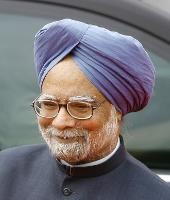NEW DELHI -- After months of vacillation, and relentless pressure from Western nations, India finally announced a unilateral climate mitigation measure to reduce its carbon intensity levels by 20 percent to 25 percent on its 2005 levels over the next 11 years. The decision comes against the looming backdrop of the United Nations Climate Change Summit in Copenhagen, which opened on Dec. 7.
The new goals mark an unambiguous departure from New Delhi's traditional position that rich nations are historically responsible for global warming and should therefore take up the bulk of the responsibility for all reduction efforts. India has in the past enthusiastically endorsed the Kyoto Protocol, which requires 37 wealthy nations to cut greenhouse gas emissions by 2012, but asked for no commitments from developing countries.
New Delhi's surprise announcement was spurred by Beijing's declaration to whittle down the carbon intensity of its own economy by 40 percent to 45 percent below 2005 levels by 2020. This development was in turn triggered by the United States' decision to cut its greenhouse gas emissions by roughly 17 percent by 2020, as compared to 2005 levels.

